In the rich tapestry of Portugal’s democratic history, the 2024 general elections represent a decisive moment, marked by seismic changes in the country’s political landscape. With the ballot boxes cast and voices heard, the contours of power have been redrawn, ushering in a new era of governance and possibility.
- AM Services
A political tectonic shift: 2024 general elections in Portugal

The rise of the right:
In a remarkable shift from previous elections, the pendulum of power swung decisively to the right. The Democratic Alliance (AD), a coalition made up of the Social Democratic Party (PSD) and the People’s Party (CDS), emerged as the main force, capturing 29.52% of the popular vote and securing 79 parliamentary seats. This victory marks a significant departure from the previous dominance of the Socialist Party (PS), which now finds itself in the role of opposition.
- A resurgent far right: Amid the changes in the political landscape, the far-right Chega party has enjoyed a meteoric rise in popularity. Rising from 7.38% in the previous election to 18.06% in 2024, Chega secured an impressive 48 parliamentary seats, becoming the country’s third largest political force. This unprecedented growth signals a recalibration of Portugal’s political discourse, with implications for the socio-cultural fabric of the nation.
- Left-wing upsurges and stability: Despite the ascendancy of the right, the left was not without its victories. The LIVRE party, which embodies progressive values and ideals, saw an increase in support, securing 3.26% of the vote and electing 4 MPs. Meanwhile, major parties such as the Left Bloc (BE) and the Unitary Democratic Coalition (CDU) maintained their positions, ensuring a certain ideological balance in Portugal’s political arena.
- Uncertainty and coalition building: With the allocation of parliamentary seats still pending due to the uncounted consulate votes, the formation of a stable government is at stake. President Marcelo Rebelo de Sousa’s consultations with party leaders aim to circumvent this uncertainty, with all signs pointing to Luís Montenegro, of the PSD, as the presumptive Prime Minister-elect. The possible inclusion or exclusion of the Liberal Initiative (IL) in the government coalition adds an additional layer of complexity to the political calculus.

A turnaround in abstention:
Perhaps most surprisingly, the 2024 elections witnessed a reversal of the long-standing trend of increasing abstention. Amid growing concerns and expectations of change, voter turnout increased, signaling a renewed engagement with the democratic process and a greater sense of civic duty among the Portuguese electorate.
As Portugal navigates the complexities of coalition building and governance after the 2024 elections, one thing remains clear: the political landscape has undergone a seismic shift. With the right ascendant, the left resilient and the far right asserting its presence, the stage is set for a period of intense debate, negotiation and transformation. As the dust settles and the nation looks to the future, one can’t help but feel a sense of anticipation mixed with apprehension as Portugal embarks on a new chapter of its democratic journey.
Did you like the story? Share your thoughts in the comments below and stay tuned for more!
